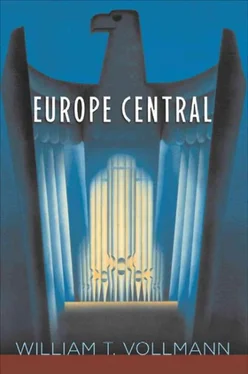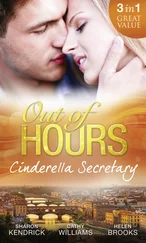511 Stalin: “If the Battle of Stalingrad signalled the twilight of the German-Fascist Army…”—Quoted in Cornish, p. 216.
THE TELEPHONE RINGS
512 Epigraph—Nikolay Rimsky-Korsakov, Principles of Orchestration, with Musical Examples Drawn from His Own Work, in Two Volumes Bound as One, ed. Maximilian Sternberg [Shostakovich’s teacher], trans. Edward Agate (New York: Dover Publications, Inc., 1964 repr. of 1922 Edition Russe de Musique ed.; R-K’s draft unfinished in 1891), p. 141 (“Voices related in fifths and fourths”). In these stories I have preferred the orthography “Rimsky-Korsakoff.”
512 “Everyone should do his own work from all the way to the end”—After Wilson, p. 288 (testimony of Evgeny Chukovsky: Shostakovich to his son Maxim). The original reads “from beginning to end.”
ECSTASY
517 Epigraph—Anna Akhmatova, My Half-Century: Selected Prose, trans. Ronald Meyer (Evanston, Illinois: Northwestern University Press, 1997 repr. of 1992 Ardis Press ed.), p. 135 (second letter, Komarovo, August 26, 1861).
521, 523, 524 The three boldfaced letters in the book—I am sorry that these seem obscure to some readers. They are E, E and a, and they mark the book’s beginning, midpoint and ending thus: “Elena E. Konstantinovskaya.” (Her name is sometimes more correctly transliterated “Yelena,” as in Fay’s biography of Shostakovich, but out of deference to people who may be unfamiliar with the letter ye, I have remained loyal to the more traditional transliteration.)
OPERATION HAGEN
525 Epigraph—“I gave her my oath that I’d not wrong her anymore…”— Nibelungenlied, p. 148 (ch. 19, “How the Nibelung Treasure Was Brought to Worms”), “retranslated” by WTV.
526 Details about reupholstering the chairs at Kranzler’s with Swiss packing twine and the “Negress” at the Golden Horseshoe—Samuel Hynes et al, Reporting World War II: Part One: American Journalism 1938-1944 (New York: Library of America, 1995), pp. 213, 219 (Howard K. Smith, “Valhalla in Transition: Berlin After the Invasion of Russia: Autumn 1941”).
527 Günther: “Complain not to me, but to Hagen; he’s the cursed boar who slew this hero!”—Libretto booklet to the Solti version of Wagner’s “Götterdämmerung” (Birgit Nilsson, Wolfgang Windgassen et al performing; Wiener Staatsopernchor, Wiener Philharmoniker, 1985), p. 206 (Act III, Scene 3, my trans. and alteration of the German libretto, which would literally read: “Complain not to me; complain to Hagen; he is the accursed boar who gored this hero!”).
528 General Nikitchenko: “The record is filled with his own admissions of complicity. There is nothing to be said in mitigation”—Uncovered Editions, ed. (“the series has been created directly from the archive of The Stationery Office in London”), The Judgment of Nuremberg, 1946 (Guildford, Surrey: TSO Publishing; printed by Biddles Ltd., Crown copyright, 1999 abr. repr. of 1946 ed.), pp. 183, 185 (Justice Jackson, judgment of Göring).
528 “The President”: “Defendant Hagen, on the counts of the indictment on which you have been convicted…”—Ibid., p. 297 (pro forma sentence for each capitally convicted war criminal).
INTO THE MOUNTAIN
529 Epigraph—Sergei Eisenstein, The Film Sense, trans. and ed. Jay Leyda (New York: Harcourt Brace Jovanovich / Harvest, 1975 repr. of 1942 ed.; original Russian ed. ca 1942; date not given), p. 183 (“Form and Content: Practice,” ca. 1942).
529 Affair of the Remagen bridge—Speer, p. 562.
529 Plan to flood the Ruhr mines—Ibid., p. 564 (the actual procedure was described by Hörner, assistant to the Gauleiter, and might not have come specifically from Hitler although it conformed to Hitler’s general order).
529 Destruction planned for Düsseldorf and Baden—Ibid., pp. 566-67. Again, there is no evidence that Hitler was involved on this minute level.
530 Conversation between Hitler and Speer—Condensed from Ibid., pp. 570-73, with alterations and additions.
530 Hitler to “the officer”: “The nature of this struggle permits no consideration for the populace to be taken”—Ibid., p. 577 (this was actually a general order to the commanders-in-chief).
530 Göring and the fate of the Philharmonic—Recounted in Ibid., p. 585.
530 Hitler: “Then the Luftwaffe is superfluous. The entire Luftwaffe command should be hanged at once!”—Slightly altered and abridged from Kershaw, p. 801.
530 Hitler to General Koller: “Any commander who holds back his troops will forfeit his life in five hours.”—Bullock, p. 783, citing Koller.
DENAZIFICATION
532 Epigraph—Vladimir Ognev and Dorian Rottenberg, comp., Fifty Soviet Poets (Moscow: Progress Publishers, 1974, repr. of 1969 ed.), p. 178 (Yevgeni Yevtushenko, “Snivelling Fascism,” my trans. of Russian text. The translation given on p. 179 softens the original).
534 Akhmatova: “I smile no more. A freezing wind numbs my lips”—Akhmatova (Hemschemeyer), p. 175 (“I no longer smile…”, 1915, from White Flock), “retranslated” by WTV.
535 The German POW: “Wälse! Wälse! Where’s your sword,” etc.—Libretto booklet to the Solti version of Wagner’s “Siegfried” (James King, Régine Crespin et al. performing; Wiener Staatsopernchor, Wiener Philharmoniker, 1985), p. 44 (Act I, Scene 3; German text trans. and slightly altered by WTV; it would more literally run: “the strong sword I’ll swing in the storm”).
535 Great Soviet Encyclopedia, entry on Germany: “A state in Europe”—Vol. 6, p. 340.
AIRLIFT IDYLLS
536 Epigraph—Leo Tolstoy, The Cossacks and Other Stories, trans. Rosemary Edmonds (New York: Penguin, 1960), p. 159 (“The Death of Ivan Ilyich,” 1886).
537 Various descriptions of Third Reich architecture in Berlin and its wartime and postwar fate—Based on photographs and text in McGee.
538 Description of Hitler’s model of postwar Berlin—Large, p. 301 (“Model of Hitler’s planned north-south axis, including the Arch of Triumph, and the domed Hall of the People.” Source: Landesbildungsstelle.). Various other descriptions of idealized and projected Nazi streetscapes are based on five of Albert Speer’s models and drawings reproduced in Antonova and Merkert, pp. 424-25.
539 Footnote: “Germany is the conscience of mankind…”—Keyserling, p. 136.
539 Elena Dmitrievna Kruglikova was the soprano who sang the first part of Lyusha in Dzerzhinskii’s opera Virgin Soil Upturned (1937).
539 Some of my codenames are fictional; some are derived from Christopher Andrew and Vasili Mitrokhin, The Sword and the Shield: The Mitrokhin Archive and the Secret History of the KGB (New York: Basic Books / A member of the Perseus Books Group, 1999), pp. 437-59 (ch. 26, “The Federal Republic of Germany”). The sad story of LOLA comes here; of course the dates make it one more anachronism.
542 Great Soviet Encyclopedia: “Love for an idea…”—Vol. 15, p. 153 (entry on love).
543 The pale, pale man who wore dark glasses: “You’ve absorbed the Russian mentality… There’s something of the Russian soul in you, that emotional, sentimental, immeasurable something…”—Closely after Gehlen, p. 127 (Gehlen is speaking about a bilingual colleague-rival).
546 “The poetess Akhmatova”: “Call this working!…”—Akhmatova (Hemschemeyer), p. 414 (“The Poet,” summer 1959), “retranslated” by WTV.
547 GRAENER: “The German people need romanticism once more”—Somewhat after a remark by the composer Paul Graener; quoted in Michael H. Kater, The Twisted Muse: Musicians and Their Music in the Third Reich (New York: Oxford University Press, 1997), p. 26.
Читать дальше












